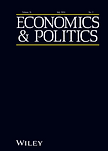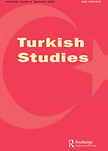Peer-Reviewed Publications

(2024) Taking Sides: Corporate Social Responsibility and Political Ideology. Economics & Politics, 1-24. (with Andrey Tomashevskiy) Abstract: In the United States and other countries, large private firms are increasingly more likely to take public political stances on controversial issues. Firms behave as ideological actors when they take sides in large public debates on social and economic issues. These stances may involve public speech, changes in the terms of service, or in internal reorganization and intrafirm actions. Despite the increase in firms' political actions, firms' ideological orientations remain unexamined. To answer this question, we collect corporate social responsibility statements from Fortune 1000 firms. Using semisupervised topic models, we identify topics that reflect stances on environmental and social issues. We then examine if firms are more likely to take stances on political issues due to pragmatic or ideological factors. We find that while pragmatic considerations play a role, firms' political stances are more driven by the ideological orientation of employees and managers. This research contributes a novel measure of firm ideology and sheds new light on the determinants of corporate political activity. Access: https://doi.org/10.1111/ecpo.12288

(2022) Turkey’s Isolation from the Eastern Mediterranean Gas Forum: Ideational Mechanisms and Material Interests. Turkish Studies, 23(1), 1-30. (with Pınar Ipek) Abstract: The energy politics highlight rising tensions and new cooperative patterns in the Eastern Mediterranean region. We question the reasons for the lack of cooperation between Turkey and regional states during the regionalization process, in terms of offshore hydrocarbon resources development, between 2010 and 2020. In contrast to power-driven accounts for cooperation, we demonstrate the role of ideational mechanisms through framing analysis and process tracing. We argue that Turkey’s isolation from the Eastern Mediterranean Gas Forum and shifts in Turkish foreign policy preferences are explained plausibly by cognitive priors, redefined causal ideas, and emulation of exogenous ideas. Access: https://doi.org/10.1080/14683849.2021.1925884
Work-in-Progress
Political Economy of Firms
Carbon Choices: MNCs and Climate Self-Regulation This paper explores why multinational corporations engage in costly environmental self-regulation and when such efforts preempt public demand for climate regulation. I argue that firms adopt private regulation as a political strategy, with their willingness to self-regulate shaped by sectoral exposure to compliance costs and the liability of foreignness. Using a multi-method approach, I combine survey experiments with American respondents and computational text analysis of Fortune Global 500 sustainability reports. The findings reveal a strong home-country bias: foreign firms with poor environmental records provoke greater support for regulation than domestic firms, yet foreign firms’ voluntary initiatives are more effective at mitigating regulatory backlash. These results shed new light on the political causes and consequences of corporate self-regulation and contribute to the literature on the international political economy of climate change.
Corporate Political Activity, Partisanship and Foreign Firms (with Andrey Tomashevskiy) Foreign firms are increasingly participating in the US political system, through lobbying, campaign contributions, or public stances on issues. Yet it is unclear how individuals evaluate corporate political activity by both foreign and domestic firms. We examine individual attitudes towards corporate political activity, arguing that individuals are more tolerant of activity when it aligns with their own policy preferences. We evaluate this hypothesis using a series of survey experiments with a representative sample of US voters, including an experiment-in-an-experiment using Large Language Models (LLMs) to generate treatments. Our evidence shows that individuals are more likely to support corporate activity by co-partisan firms. The pragmatic co-partisanship effect extends to both domestic and foreign firms. Our results suggest that individuals' ideological preferences on corporate participation override principled concerns regarding democratic fairness and foreign meddling. These findings offer new insights into corporate political activity and the use of LLMs in research.
Resources and Territorial Disputes
Losing Territorial Sovereignty and Resource Access: Computational Text Evidence from Turkiye This article investigates the sources of elite perceptions of territorial sovereignty and resource access in maritime disputes. I argue that three types of adversary-initiated events—bilateral maritime boundary agreements, offshore licensing, and resource discoveries—alter the perceived maritime status quo and heighten domestic concerns over losing sovereign rights and future resource access. I use novel data from 912 Turkish parliamentary speeches (1996–2024) and apply a set of computational text-analysis methods to measure sovereignty- and resource-related rhetoric. I then link these measures to original event-level data from the Eastern Mediterranean to identify how rival actions reshape elite assessments. The results show that offshore licensing produces large bipartisan increases in sovereignty rhetoric, while confirmed discoveries further fuel concerns over territorial sovereignty and resource access. Maritime boundary agreements activate the most securitized form of sovereignty rhetoric, which strongly predicts subsequent involvement in militarized interstate disputes. These findings clarify how external shifts place ruling and opposition actors in a shared domain of losses and generate domestic pressures for escalation.
Territorial Loss Aversion and Energy Security: Public Support for Use of Force Governments often deploy territorial loss framing and energy security narratives simultaneously in disputes over resource-rich territories to rally domestic support, constrain political opposition, and signal stronger resolve to adversaries. However, while these tactics may bolster a state’s bargaining position, they also inadvertently risk entrenching public commitment to hardline policies and increasing the cost of territorial concessions, even when economic interests favor cooperation. To test this argument, I administered three online survey experiments with the American public. The results show that these combined narratives effectively mobilize support for territorial aggression. Yet, the moderating effects of domestic opposition vary depending on how resources are framed and who the adversary is. This article contributes to growing research on the micro-foundations of territorial disputes, the application of prospect theory in international relations, and the securitization of international energy politics.
How Oil Shapes the Escalation of Strategic Rivalries in Maritime Disputes: Discovery, Prices, and Dependency This article examines how international energy market conditions shape the escalation of maritime disputes between rival states. Rivalries are especially prone to credible commitment problems when bargaining over contested, resource-rich territories, making them sensitive to shifts in future bargaining power. I argue that the onset of offshore oil production and exports, high oil prices, and market volatility exacerbate these problems, prompting risk-acceptant strategies and increasing the likelihood of military escalation. By contrast, energy trade dependency between rivals mitigates these dynamics and reduces escalation risk. I test this argument using observational data from the Western Hemisphere and Europe between 1945 and 2001. The results show that production, high prices, and volatility each raise the probability of conflict escalation, while greater energy dependence lowers it. These findings move beyond binary measures of resource presence to demonstrate how market conditions and interdependence shape the militarization of rivalries over the sea.